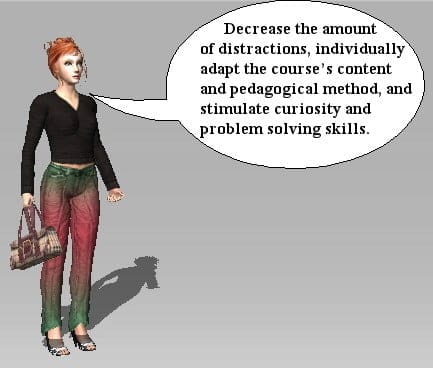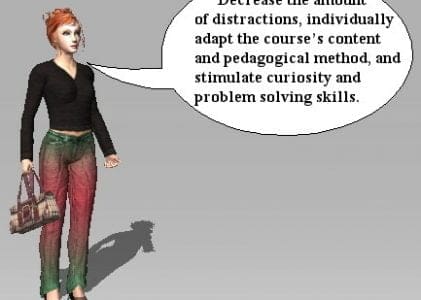 Decrease the amount of
Decrease the amount of![]() distractions, individually adapt the course’s content and pedagogical method, and stimulate curiosity and problem solving skills. This is some of the building-blocs to a motivating brain-adapted learning environment according to seven brain-scientists that was interviewed in the daily paper Dagens Nyheter May 15, 2011.
distractions, individually adapt the course’s content and pedagogical method, and stimulate curiosity and problem solving skills. This is some of the building-blocs to a motivating brain-adapted learning environment according to seven brain-scientists that was interviewed in the daily paper Dagens Nyheter May 15, 2011.
They also agree that the result of the brain research should be more commonly used as a basis for pedagogy in practice. To use Daniel Ansaris words, Associate Professor in Psychology at the University of Western Ontario: ”Education for teachers should include basic courses in neuroscience.”
Four ingredients that improve motivation
Introduction:
Pedagogically introduce the course and its parts in concern of content, course structure, use of technology and teaching aids. Pedagogical means in this case that the introduction should fit all learning-styles and minds.
To give best possible support:
Support during the course is equally important. Meaning to clarify the aims that should be accomplished, to motivate the student to connect the course’s content with everyday life and working life in order to integrate the content with student’s own experience.
Incitement of the student to finish the course:
Such incitements could be prospects to receive new skills for future employment opportunities, to continue studying on higher level or make improvements in the everyday life.
Technology:
Information and communication technology used in the right way means an almost revolutionising development for study motivation, the improvements are several. Course-material in the form of interactive content where the student receives different forms of response on the tasks that she performs is available 24/7. Response on learning is thereby not limited to the few teacher-hours that the course have. At the same time that the possibilities to communicate with other students improves. The learning-process could thereby take place when the student has the most motivation, which means learning that is adapted to the brain’s prerequisites.
Motivation with pedagogical computer games
Professor Martin Ingvar says the following about computer games and learning: ”If they force the user to concentrate, to develop a strategy to learn things and then award when it goes well, then it could have effects.” (Svenska Dagbladet May 8, 2007)
Professor Torkel Klingberg mentions The Legend of Zelda: The Wind Walker and the Sims that demands exploration and to go through a hierarchy of goals. And says: ”Often equally signs are put between computer games and junk food. That is wrong.” Some simple shooting games is mostly built on stimulus driven attention, a hotdog with bread, but the scale goes all the way to the five star restaurant that combine benefit with motivation.
Research on computer games either focus on games as stories or the gaming in it self, despite that it is the total experience that is the main strong point. A computer game as well as the broader eLearning term is a multimedia experience, an interactive story that demands concentration ability, simultaneous capacity and can be repeated unlimited for the benefit of learning.
Written by LarsGoran Bostrom©
Source:
http://www.aktivtdeltagande.se/Word-filer/inlarning_anstrangning.html
Så vill hjärnforskarna ändra skolan by Karin Bojs Published 2011-05-15
http://www.dn.se/nyheter/vetenskap/sa-vill-hjarnforskarna-andra-skolan
Opens in a new tab



